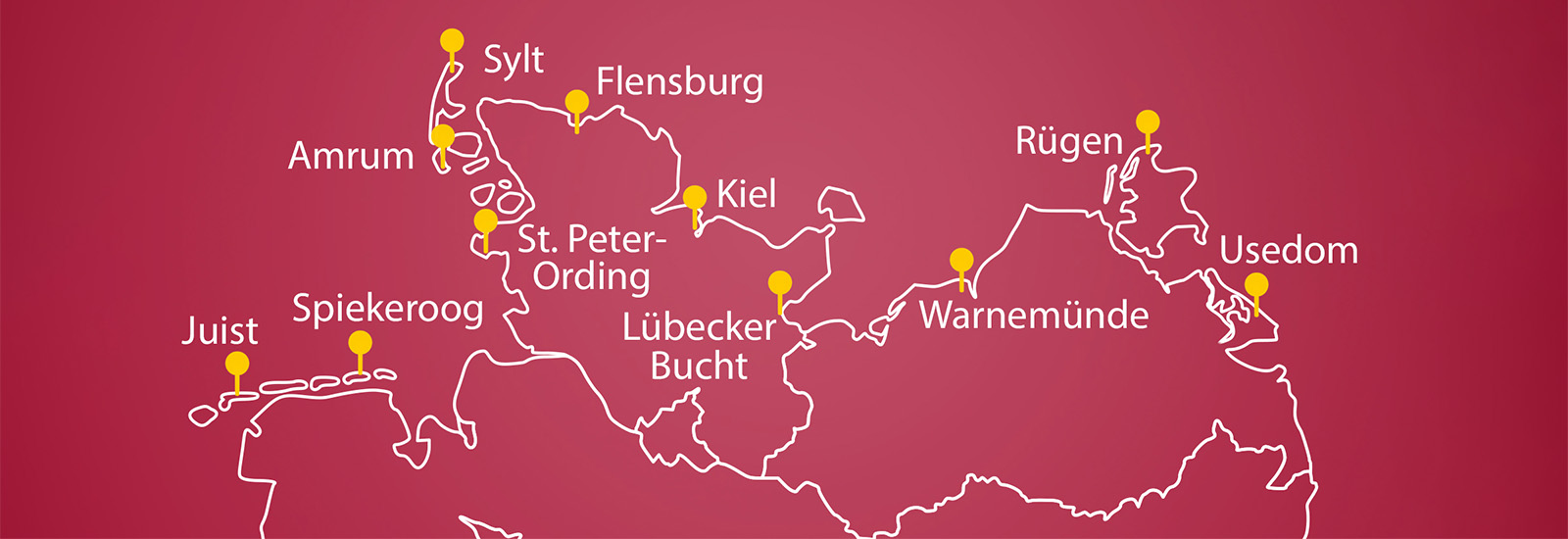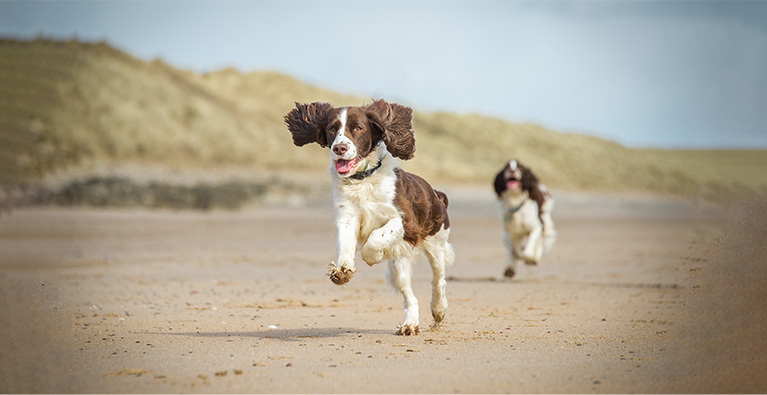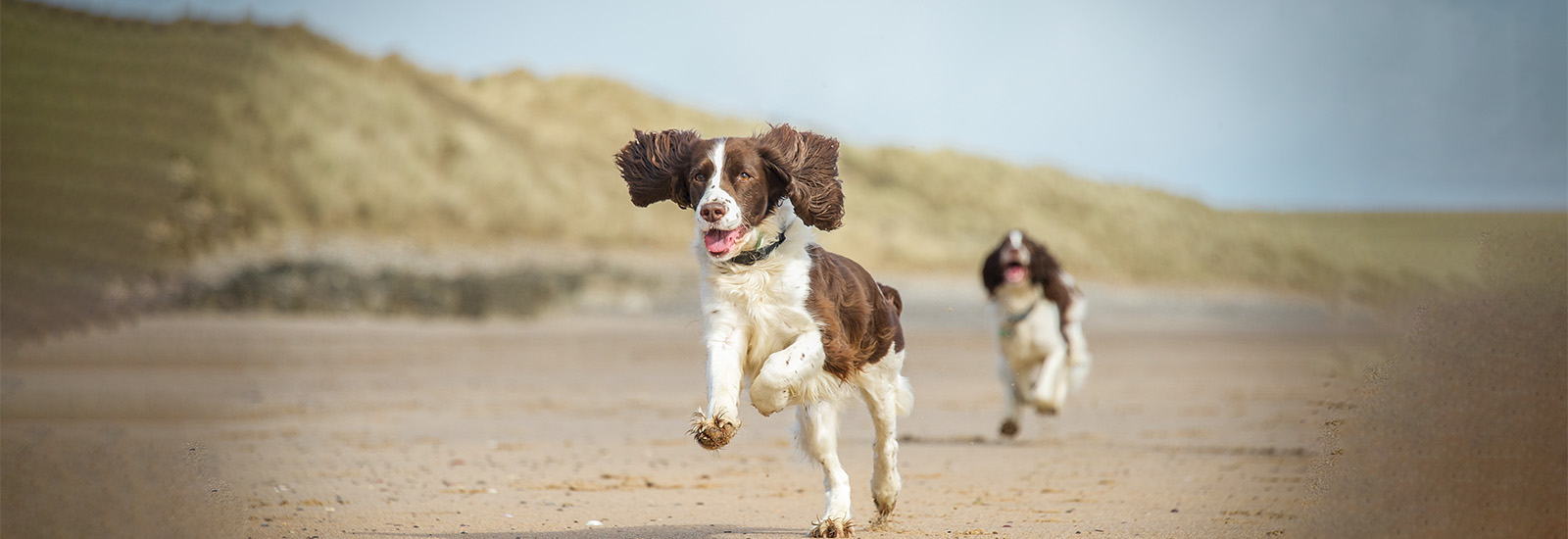The best dog-friendly beaches in Germany
Are you planning a holiday with your dog on the Baltic or North Sea? We will show you where you can find the best beaches for dogs and outline the rules that apply there.
A holiday with your dog by the sea
If you have a dog, you do not have to miss out on a relaxing holiday by the sea. And it doesn’t have to be the South Pacific because there are some gorgeous sandy beaches on both the North and Baltic Seas. Getting there is easy, because you can take your own car. There is also no shortage of hotels and other accommodation that welcome dogs.
Now it is simply a matter of finding a nice beach where dogs are allowed. Depending on the destination, it is advisable to gather information in advance, because unrestricted access and lead-free walking may not always be allowed. Fortunately, many places have specially designated dog beaches. We have put together a nice selection of dog-friendly beaches that we would like to share with you briefly.
Lovely dog beaches on the North Sea
The German North Sea coast is over 600 kilometres long and offers numerous dog beaches. Here are our suggestions for your next holiday on the North Sea:
- Sylt
The island of Sylt has a reputation for being particularly dog-friendly. There are 15 designated dog beaches. Apart from a few exceptions, dogs are allowed to roam freely there. The sections of beach are mainly on the west coast and are nicely spread out from the northern to the southern tip. There are dog-friendly beaches in Westerland, Wenningstedt, Kampen, Rantum and Hörnum, among other places.
- Amrum
The island of Amrum has three gorgeous dog beaches near Norddorf, Wittdün and Nebel. It is, however, compulsory to keep dogs on a lead everywhere on the island, because many birds breed there.
- St. Peter-Ording
This district in North Friesland is part of the Wadden Sea National Park, where leads are normally compulsory at all times. Dogs are, however, allowed to run around off the lead in two specially provided dog areas in the resort. In addition, there are five dog beaches on the offshore coast: Böhl, Ording, Ording-Nord, Dorf and Bad.
- Juist
The small East Frisian island is also known as the dog island. Although there are two specially designated dog beaches, “West” and “East”, dogs have to be kept on a lead because the island is part of the Lower Saxon Wadden Sea National Park.
- Spiekeroog
A dog beach has been created on the eastern part of the beach. Here, your pet is allowed to run around and play with other dogs without a lead. In all other areas of the island, dogs have to be kept on a lead.

Lovely dog beaches on the Baltic Sea
The German Baltic Sea coast is almost 1000 kilometres long and has numerous beaches for dogs. Four-legged friends are usually allowed to walk there without a lead. Here are our suggestions for a great holiday on the Baltic Sea:
- Rügen
Almost all seaside resorts on the island of Rügen have designated dog beaches. There are 14 of them in total, some of which allow dogs on the beach without a lead. These include the dog beaches in Dranske, Nonnevitz, Juliusruh, Glowe, Prora and Binz. Off-season, you can walk your dog on almost all of the island’s beaches.
- Usedom
This Baltic Sea island has a number of dog-friendly beaches. Officially, leads are compulsory on all beaches, but depending on the season and the number of visitors, this is not always strictly enforced. You should, however, avoid abusing this freedom, and always keep your four-legged friend under close supervision. Popular dog beaches include Karlshagen, Zinnowitz, Ückeritz, Bansin, Ahlbeck, Heringsdorf, Kölpinsee and Trassenheide.
- Warnemünde
There are four dog beaches just north of Rostock (Diedrichshagen, Warnemünde, Hohe Düne, Markgrafenheide). The rules vary regarding keeping dogs on a lead and the times these beaches can be used. To be on the safe side, you should check with the local authorities. From October to April, you can take your dog with you on any beach, however from Westermole to beach 21 it is compulsory to keep your dog on a lead.
- Flensburg
With its dog beaches Ostseebad and Solitüde, the city of Flensburg provides two opportunities to walk your dog without a lead. In the period from 1 October to 31 March, you are also allowed to take your four-legged friend to all the other beaches.
- Kiel
There are several dog beaches just to the north of Kiel including Falckensteiner Strand and Schönberg. The largest by far, however, is the Laboe dog beach. The area is over 10,000 square metres in size and dogs are allowed to run around freely. A veritable paradise!
- Bay of Lübeck
The seaside resorts in the Bay of Lübeck have several specially designated sections of beach for dogs where leads are not required. The most popular dog beaches are Dahme, Grömitz, Kellenhusen, Rettin, Sierksdorf, Scharbeutz and Timmendorfer Strand. In summer, dogs are not allowed on the main beaches, however off-season almost all beaches are open for dogs on leads.
Rules for dogs on the beach
There are no Germany-wide regulations for taking dogs to the seaside. Each resort is free to set its own rules. It is therefore important to get information from the local authorities. The following often applies: off-season, i.e. from around October to March, dogs are allowed on all beaches. In many cases even without a lead, however leads are compulsory in Nature Conservation Areas.
The best place to take your four-legged friend is one of the many specially designated dog beaches. Watch out for the signs that can usually be seen on every dog beach that list the rules that currently apply. Even on a dog beach there is no guarantee that you can take your dog off the lead all year round.
When dogs drink seawater
When a dog is enjoying itself in the sea, it is almost impossible for it not to swallow a little salt water now and then. Small amounts are usually not a problem, but larger amounts can lead to vomiting, diarrhoea, cramps and agitated behaviour. If you already know that your dog is susceptible to this, you should only let it swim in the sea for a limited period of time.
It is also advisable to avoid playing fetch in the water, as your pet will automatically swallow a lot of water. If the dog has more than just slight diarrhoea, it is advisable to consult a vet.
You may also like this

Holidays with your dog
How to prepare for a holiday with your dog

Keeping your dog occupied
Occupation is important for a dog

Diarrhoea in dogs
Possible causes and remedies for diarrhoeal diseases

Daily routine with dogs
A regular daily routine is important for dogs

